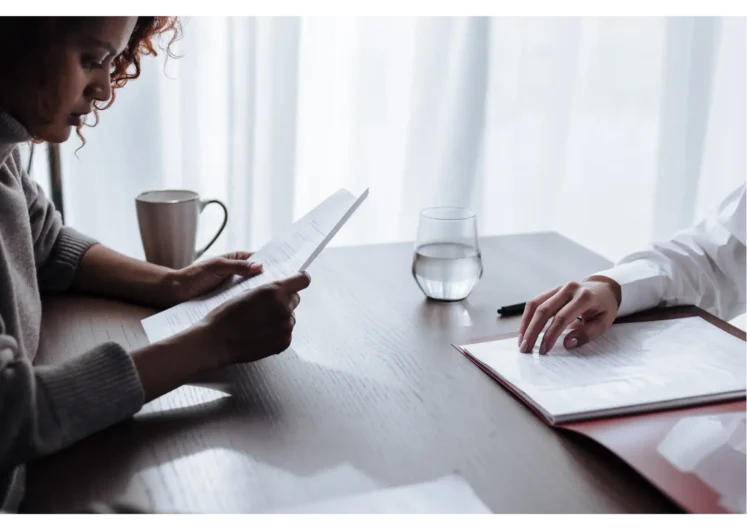Encountering victims of human trafficking

On this page, you will find guidance on how to encounter victims of human trafficking and help them talk about their experiences before they have sought help.
You will also find advice for authorities and organisations whose customers have been admitted to the assistance system for victims of human trafficking.
Remember these points when you meet a trafficking victim
- Ensure safety. Do not endanger your own or the victim’s safety. If the victim is in immediate danger, call the emergency number 112.
- If you think a crime may have taken place, do not try to solve it yourself. Solving crimes is a job for the pre-trial investigation authority. Do not contact the person exploiting the victim, and ask the victim not to contact them either. Do not spy on or follow the person exploiting the victim. Do not try to revenge them. All this may harm the victim’s position and the crime investigation, and cause problems to you.
- Try to meet in a comfortable setting. You can, for example, organize chairs in a way that allows you and the victim to sit in equal positions. If you sit behind a desk and on a chair that’s larger than the one the victim is sitting on, it may epmhasize a position of authority. This can be harmful to creating a trustful connection with the victim.
- Listen. Listen to the victim’s story. Give space and time to the victim to talk about their situation. With the victim’s consent, you can write down the victim’s story so that they do not have to retell it, if they decide to seek help.
- Be ready to encounter difficult issues. The victim may have experienced shocking events. Keep calm. If you panic, you cannot help the victim. Do not talk about how horrified you are, or try to mystify human trafficking and the victim’s experiences. Trust your own ability and chances to get some help for the victim. It is always better to listen than to comment.
- Do not express how horrified or surprised you are. For example, do not say: “That’s just unbelievable!” The victim may think that you do not actually believe them.
- Believe the victim. The victim may doubt their own experiences. Doubt is part of the process that helps the victim come to terms with the abuse they have experienced.
- Strengthen the victim’s feeling of innocence. The victim may belittle their experiences or wonder about their own part in becoming a victim. The victim may have been pressured to do things that they consider illegal or that are illegal. In Finland, however, victims of human trafficking should not be punished for crimes they were compelled to commit, and when they could not reasonably have refused to commit them.
- Do not belittle. Human trafficking takes many forms. Do not compare the victim’s experiences with those of others. However, you should tell the victim that they are not alone with their experience, that you can get away from abuse, and that survival is possible.
- Remember that a trafficking victim has rights. The authorities and other helpers are responsible for ensuring that victims are given information about their rights, and that they can actually access services. You will find guidance on this site for getting help for victims.
- Try not to use the victim’s friend or escort as an interpreter. They may be working for the abuser or inform the abuser of the victim seeking help. If you and the victim do not share a common language, and you cannot access interpreting services yourself or through your work, contact the Assistance system. It may be able to get an interpreter who speaks the victim’s language. However, getting an interpreter may take up to 24 hours.
Things to remember when your customer is a victim of trafficking
Are you a municipal or government worker who encounters customers of the Assistance system for victims of human trafficking? Are you a company or organisation that provides services for victims of human trafficking, who are customers of the Assistance system? Remember these guidelines when you encounter victims of trafficking.

- Do not interrogate. The pre-trial investigation authority is responsible for investigating a potential human trafficking offence. If your role is to help and support the victim, it is enough for you to know generally about the victim’s story and the kind of abuse they have experienced. That will help you meet the victim’s service needs appropriately. Do not ask the victim for a detailed account, but do give them space to talk about their experiences if they wish.
- Help the victim in partnership with others. Before you discuss the situation with the customer, find out about the responsibilities and views of the authorities and other people involved. The customer should not have to worry about the service network or the respon-sibilities of various bodies in a situation that is stressful enough already. Neither should the customer have to listen to potentially differing views of the authorities and others involved about how to support the victim or provide the services. Try to find a common goal and shared understanding for all people helping the victim. By doing so, you will not confuse or stress the customer, and you will create a feeling a safety by acting systematically and predictably. You should always focus on the victims and how to best help them.
- Be ready to be flexible. Falling victim to human trafficking involves issues such as the victim’s trauma, their protection against security threats, a potential criminal process and the victim’s restricted ability to function. These issues often require the helpers to try completely new ways of working and cooperating with the other people involved. Within the limits of what is possible for you, be prepared for this.
- If the victim does not come to an agreed meeting, find out exactly why. There are several reasons why the victim does not come to an agreed meeting. They might not know how, or they may be afraid or feeling unwell. The victim may not know how to use public transport or they might not know their surroundings, even after spending years in Finland. Sometimes victims need special help for using the services, or even coming to the meetings independently.
- Remember that a trafficking victim has special rights. The authorities and helpers are responsible for ensuring that victims are given information about their rights, and that they can actually access services. For example, do not question the right of a foreign national to reside in Finland and get help. Before giving information or options to the victim, first find out the facts.
- Accept your own role and the limitations of your helping role and do your best within those limits. Only make such promises to the victim that you know you can fulfil. Build-ing trust may be very challenging anyway, even without disappointing the victim unnecessarily by promising things that you cannot deliver. Do not criticise other people in front of the victim, but deal with any conflicts with the person involved. Offer facts, not opinions.
- Do not get the media involved. The Assistance system for victims of human trafficking does not ask its customers to give media interviews or photographs, or pass on interview requests to customers. The Assistance system applies the same rule to its service providers. Do not photograph, video or record the victim for your own projects either. It is not acceptable, even if you maintained the victim’s anonymity. It’s best you don’t even ask the victim if they would like to do an interview etc., as they might feel obliged to say yes thinking, that they owe you as much.